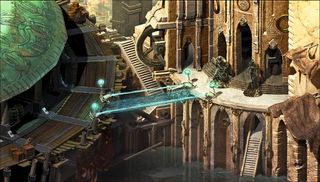Torment: Tides of Numenera preview - choice and consequence in an all-star old school RPG

In the 14 years since its release, fans of the original Planescape: Torment have maintained a chorus of support for the game: how its setting was so unlike the D&D-derived RPGs of its era, how smartly its narrative settled around character rather than epic action. When Wasteland 2 developers inXile pitched a sequel on Kickstarter, that cult status carried it to its funding target in six hours. At the end of the campaign, almost $4.2 million had been raised by fan donations.
The backdrop has changed from the Planescape multiverse to Numenera , a new setting by veteran RPG designer Monte Cook. Here, Earth has been seeded with technology and magic by the rise and fall of successive civilisations. “We wanted something radically different from most people's experiences,” writer and Planescape: Torment designer Colin McComb tells me. “We're still going to be hitting the philosophical elements: what it means to be alive, what it means to weave a legacy, what it means to interact with other people, [but] Numenera allows us to break free of the basic expectations people have.”

In Numenera, you play a unique being who feels no pain but has the power to redistribute the suffering of others. This concept – 'torment', if you will – will be one of the major factors in linking the game's combat with its dialogue system. Interestingly, inXile are letting tone and narrative lead game design. “The D&D licensed games were very much tabletop first, and the computer game's job was to translate that experience,” says producer Kevin Saunders. “Here we're able to have the computer experience come first.”
Pain might be a central theme, but inXile don't want the experience to be punishing. It's important to the developers that we feel 'listened-to' by the game, and rewarded for paying attention by the responsiveness of the world to our actions. Rather than negative endings, then, consequence is more about responding in a way the player feels is right.

“We want to make sure that every ending is thematically appropriate for the choices the player has made throughout the game,” McComb says. “We're not going to be like 'now it's time for you to be stretched out on the rack! Here come the thumb-screws!' It's going to be about the choices you make. How much are you willing to take on, and what will you shove off onto other people. What kind of person does that make you?”
Talking to inXile, there's an evident (and refreshing) respect for the intelligence of their audience. “They would be disappointed if we didn't challenge them intellectually,” Saunders says. That's not a sentiment you hear very often in gaming. In the case of Numenera, it's backed up by a 4.2 million dollar mandate from the fans.
PC Gamer Newsletter
Sign up to get the best content of the week, and great gaming deals, as picked by the editors.
Joining in 2011, Chris made his start with PC Gamer turning beautiful trees into magazines, first as a writer and later as deputy editor. Once PCG's reluctant MMO champion , his discovery of Dota 2 in 2012 led him to much darker, stranger places. In 2015, Chris became the editor of PC Gamer Pro, overseeing our online coverage of competitive gaming and esports. He left in 2017, and can be now found making games and recording the Crate & Crowbar podcast.
Most Popular


